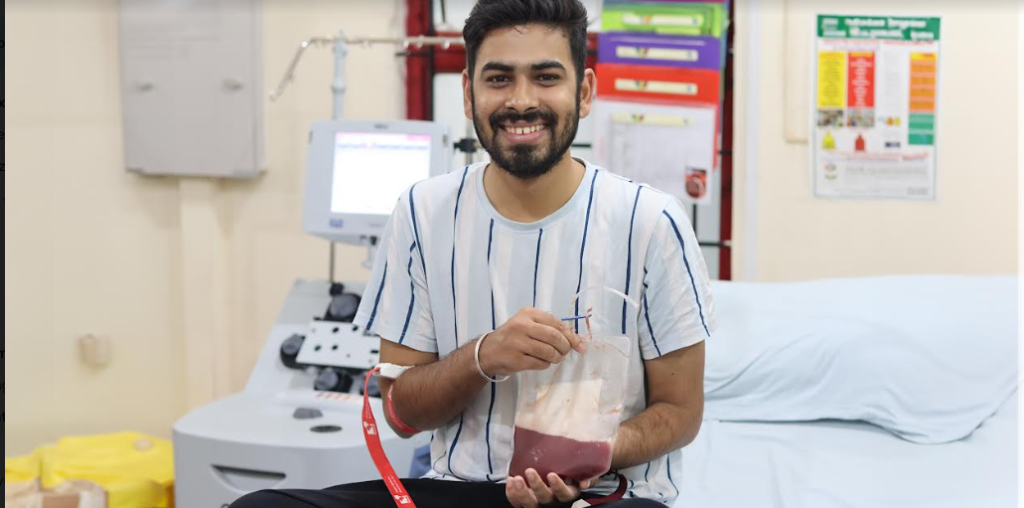
Hyderabad, 28th May 2024: India, home to over 1.3 billion people, faces a severe shortage of blood stem cell donors. With only 0.09% of the population registered as donors, the need for more people to join the stem cell registry is the need of the hour. In light of World Blood Cancer Day which is commemorated every year on May 28, DKMS BMST Foundation India is calling on citizens to come forward and register as blood stem cell donors.
Every year, over 1 lakh people from India are diagnosed with blood cancer and disorders such as thalassemia and aplastic anemia. For many of these patients, a blood stem cell transplant is their only hope for survival. While conventional methods like chemotherapy and radiation therapy are available, a blood stem cell transplant is often crucial for patients who are at high risk of relapse or who do not respond well to conventional treatments.
Patrick Paul, CEO of DKMS BMST Foundation India, stresses the urgency of the situation: “In India, someone is diagnosed with blood cancer or a severe blood disorder every five minutes. Despite the global registry having over 41 million donors, India has only about 0.6 million registered. Thousands of patients are in dire need of matching stem cell donors to undergo life-saving transplants. We need to expand our donor database significantly to provide these patients a fighting chance.”
Dr. Nitin Agarwal, MD Transfusion Medicine, Head of Donor Request Management at DKMS BMST Foundation India, points out that a significant barrier to increasing donor numbers is the lack of public awareness. “Many people in India are unaware of what blood stem cell donation involves or have incorrect beliefs about the process. It’s crucial to understand that matching for stem cell transplants is based on Human Leukocyte Antigen (HLA) characteristics, not just blood type. Education is key to dispelling these misconceptions and encouraging more people to register.”
Public education campaigns are essential to address these issues. Misconceptions about the complexity and risks of the donation process deter many potential donors. Providing clear and accurate information can help people make informed decisions about registering as donors.
24-year-old Kunal, a blood stem cell donor, shared her experience: “In December 2022, I stumbled upon social media posts highlighting the importance of stem cell donation in the fight against blood cancer. I registered as a potential donor with DKMS-BMST by giving my cheek swab samples, but I thought it was a long shot that I would actually be called for a donation, considering how rare the opportunity was. Little did I know that this decision would lead me on a remarkable journey that would change my life and a total stranger’s life forever. Donating blood stem cells was one of the most fulfilling experiences of my life. The procedure was straightforward and caused minimal discomfort. I strongly encourage others to register as stem cell donors; it’s a safe process that can significantly impact someone’s life.”
Another donor, 23-year-old Loni Lipsa, echoed this sentiment: “I initially had misconceptions about the process involved, but I was pleasantly surprised by how simple and painless it was. One of the challenges was to get my parent’s permission to go ahead with the donation. Due to the lack of awareness, many people don’t know the importance of registering and if given a chance donating their stem cells. The thought of potentially saving someone’s life made every step worthwhile.”
This World Blood Cancer Day, we call upon people to take the first step towards becoming a lifesaver. To become a potential stem cell donor, the criteria is to be a healthy adult aged between 18 and 55.
You can register as a blood stem cell donor by ordering a home swab kit at www.dkms-bmst.org/register. Once you receive the swab kit, fill out a consent form and swab the inside of your cheeks to collect tissue cells and send your sample to the registry. Your buccal swab sample will be sent to a lab for HLA (Human Leukocyte Antigen) analysis and anonymously listed on an international donor search platform. Increasing awareness and encouraging more registrations for blood stem cell donors can provide hope to countless patients. Someone’s decision to register can make a life-saving difference to many lives.